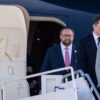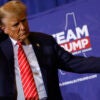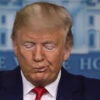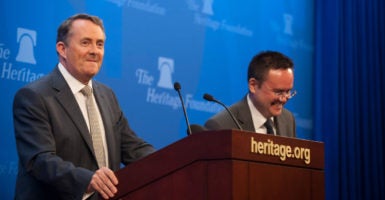This is not the time to back off on free trade. In fact, as British conservative Liam Fox said recently, it is the time to intensify efforts.
“Free trade has allowed us to take 1 billion of our fellow human beings out of abject poverty in just one generation–one of the greatest achievements in history,” Fox said in a July 25 speech at The Heritage Foundation in Washington.
Fox, the United Kingdom’s secretary of state for international trade and a member of Parliament, was at the leading conservative think tank to deliver the 10th annual Margaret Thatcher Freedom Lecture, which honors the late British prime minister’s principles, ideals, vision, and legacy.
Previous such lecturers include former U.N. ambassador John Bolton, now President Trump’s national security adviser; the late American commentator Charles Krauthammer, British journalist Charles Moore, Israeli human rights activist Natan Sharansky, former Australian prime minister John Howard; and Sen. Ted Cruz, R-Texas.
Fox said the United Kingdom will be best served by an outward-facing trade policy post-Brexit and warned against protectionism.
Developed nations that have prospered through free trade cannot close the drawbridge behind them, he said. Free trade benefits both developed and developing nations, he said, referring to a study by the Organization for Economic Development and Cooperation:
During the 1990s, per capita income grew three times faster in the developing countries that lowered trade barriers than in those that did not. That effect is not confined to the developing countries, either. The OECD Growth Project found that a 10 percentage-point increase in trade exposure was associated with a 4 percent rise in income per capita. Free trade works.
With the United Kingdom departing from the European Union, the U.S. and U.K. have an opportunity to strike a mutually beneficial trade deal that will deepen the U.S.-U.K. special relationship, Fox said.
“For the first time in more than four decades, the United Kingdom will have an independent trade policy required to forge closer ties to our closest economic partner, through an ambitious free trade agreement,” he said.
Such an agreement would have economic as well as strategic benefits, he said. It would strengthen the transatlantic link, invigorate the American and British economies, and help both remain at the vanguard of innovation.
Allies are stronger when they stand together, and this is especially true in a rapidly evolving world, Fox said.
“The U.K. and U.S. are ideally placed to work together to modernize and make the international rules-based trading system work better, so the benefits of free trade can truly be felt by all.”
In an era when the tenets of free trade are increasingly questioned, Fox’s remarks on a future U.S.-U.K. trade agreement underscored the tremendous opportunity the two nations now have to strengthen the special relationship and present a united front in defense of free trade in a changing world.































